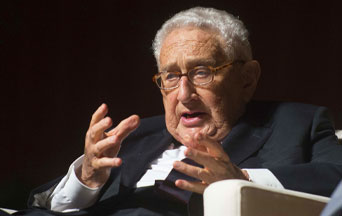
On November 28, 2023, Henry Kissinger died at 100. The former secretary of state advised ten presidents and participated in countless international forums. Until the end, he visited with foreign statesmen and wrote op-eds in major media. Few were the honors he did not receive. All doors were open to him.
His death signals more than his passing into eternity. It coincides with the chaotic events now ripping apart the framework he helped put in place. A disastrous Kissingerian era of concessions, compromises, and surrenders is ending as the world enters an unknown and uncertain future.
A Controversial Man Rewarded for His Failures
Few statesmen have been rewarded so richly for such great failures. Indeed, he won the Nobel Peace Prize for his role in the Paris Accords, which brought an end to American involvement in Vietnam and the fall of South Vietnam into communist hands.
Whether it is the Middle East, Taiwan, or Ukraine, the world is still paying the consequences of his brokered agreements, “magical” shuttle diplomacy and brutal “realism.” He was controversial, as both the left and the right now find fault with his legacy.
Dr. Kissinger entered the national political scene with his appointment by President Richard Nixon as assistant for national security affairs in December 1968. He later served as secretary of state from 1973 to 1977 under the Nixon and Ford Administrations. After leaving the White House, he maintained a weighty presence on the American political scene with frequent commentaries and consultations.
Changing the Direction of American Foreign Policy Leftward
He is remembered for changing the direction of American foreign policy leftward in a series of moves that prolonged communist rule and softened Western resolve.
Eternal and Natural Law: The Foundation of Morals and Law
Suffice it to recall his three greatest foreign policy catastrophes realized in 1972.
As secretary of state, he did what few leftists would dare to do. He took the world’s most anti-communist government under President Nixon to engage with the world’s most brutal communist governments. He granted these regimes the best terms that always favored the spread of Communism.
These offers were made when communist governments suffered from great weakness due to their disastrous economic systems and when the movement experienced a decline in its persuasive power to mobilize the world masses.
The China Visit Prepared the Way for Torrents of Western Money
The 1972 diplomatic offensive began with President Nixon’s visit to Red China and tyrant Mao Zedong on February 22. The visit led to the shameful “One China” policy, thus betraying Taiwan. This small opening brought torrents of Western aid and investment monies into China.
This monster of the West’s own making now threatens the world sixty years later. The West was the loser in this risky game. It has made every concession while Communism still rules supreme in a now-militarized China that challenges America and the West.
The Russia Summit to Save the Soviet Regime
In May 1972, Henry Kissinger arranged a summit in which President Nixon paid a state visit to Moscow to sign ten formal agreements. The anti-communist president developed a policy of détente that warmed relations between the U.S. and the Soviet Union.
The accords included extended credits, grain export, industrial development, arms limitations and other benefits that favored the economically-challenged communist regime. Indeed, the ABM Missile Treaty (SALT I) hampered American defense efforts to the point that President George W. Bush was forced to withdraw from it.
Dr. Kissinger’s support for Russia continued even to the present with his plea for compromise and concessions after the brutal Russian invasion of Ukraine.
 Learn All About the Prophecies of Our Lady of Good Success About Our Times
Learn All About the Prophecies of Our Lady of Good Success About Our Times
His crowning achievement was his most obvious and spectacular failure—the 1972 “breakthrough” of the Paris Accords negotiating the end of the Vietnam War. President Nixon’s “peace with honor” consisted of the withdrawal of American troops from South Vietnam and the subsequent cutting off of funding.
The failed agreement made him the public figure whose name symbolizes all the disasters and shame that the Free World suffered in Vietnam. Countless Vietnamese lost their lives in this debacle, and the West took decades to regain its confidence after this negotiated defeat.
Thus was the legacy of Henry Kissinger. He masterminded a policy shift leftward carried out by the right. He took the West from a position of strength to one of weakness. The communist regimes gained the time, trade and Western investment funds needed to survive their disastrous policies and build up their military might.
Everything was sacrificed to reach a modus vivendi with Communism to avoid war and conflict. America and the West now face the tragic consequences of his policy of concessions, détente, unprincipled trade and the offshoring of so much of our manufacturing base to an ideological enemy bent on our annihilation.

